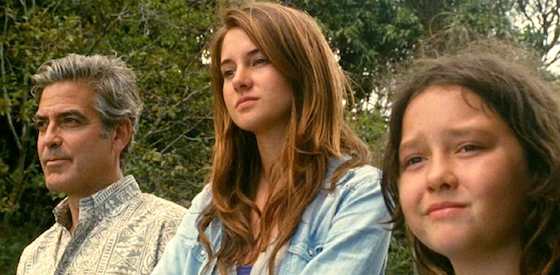- MENU
- HOME
- SEARCH
- WORLD
- MAIN
- AFRICA
- ASIA
- BALKANS
- EUROPE
- LATIN AMERICA
- MIDDLE EAST
- United Kingdom
- United States
- Argentina
- Australia
- Austria
- Benelux
- Brazil
- Canada
- China
- France
- Germany
- Greece
- Hungary
- India
- Indonesia
- Ireland
- Israel
- Italy
- Japan
- Korea
- Mexico
- New Zealand
- Pakistan
- Philippines
- Poland
- Russia
- South Africa
- Spain
- Taiwan
- Turkey
- USA
- BUSINESS
- WEALTH
- STOCKS
- TECH
- HEALTH
- LIFESTYLE
- ENTERTAINMENT
- SPORTS
- RSS
- iHaveNet.com: Movie Reviews

4 Stars
"The tropics make it difficult to mope," observes the beleaguered father and conflicted landowner at the heart of the novel "The Descendants."
Written by Kaui Hart Hemmings, the 2007 book expanded upon Hemmings' short story "The Minor Wars," and the tale is set on two Hawaiian islands -- parts of the world, as Hemmings writes, where the men of influence resemble "bums or stuntmen" on permanent vacation.
The book has now become the first feature from director and co-writer Alexander Payne since "Sideways" came out seven years ago. It's lovely -- funny and sad and funny/sad in ways you can't always pinpoint, capturing both the perpetual Pacific island breezes and the unsettled interior lives of Hemmings' characters, chief among them the attorney played by George Clooney.
Matt King's reckless, charismatic wife, Elizabeth, lies in a coma. A few weeks into the crisis, with Elizabeth hanging on by an invisible thread, Matt learns what his older daughter, a recovering addict played with a fierce lack of sentiment by Shailene Woodley, already knows: Elizabeth had taken a lover at the time of her boating accident.
How can this situation in any way be fit for a comedy? Luck and skill. Hemmings' sense of humor, which recalls Lorrie Moore's ("Birds of America"), dovetails very neatly with Payne's gently sardonic outlook. The film treats the serious business of life and death with a light hand, while handling the overtly comic material with a sneaky sense of gravity. "The Descendants" makes quality look easy. It's one of the year's most pleasurable American movies.
Clooney's Matt runs the show, but for a good while the show appears to be running him, forcing him into a defensive position. Half-Hawaiian, he is heir (along with various relatives, including his cousin Hugh, played by Beau Bridges) to a mouthwatering 25,000 acres handed down by his ancestors. Matt must cast the deciding vote on who will buy the property, and what will be developed there.
Payne gravitates naturally toward road movies, and "The Descendants" qualifies as an island-hopping variation on the genre. After learning the identity of his comatose wife's lover (a real estate maven played with exquisite discomfort by Matthew Lillard), Matt heads off to confront him in some way or another, accompanied by daughters 17-year-old Alex (Woodley) and 10-year-old Scottie (Amara Miller). They're joined also by Alex's not-quite-a-boyfriend, Sid, played by Nick Krause, who makes every conceivable stoner-slacker cliche newly viable.
The destination in "The Descendants" is clear, but Payne makes each detour count. When Robert Forster shows up as Elizabeth's quick-tempered father, a man who takes a hilarious dislike to Sid, it's wonderful comic relief. Then he returns later in the film and breaks your heart. The same goes for Judy Greer, who, like Forster, contributes a supporting turn worthy of an Oscar nomination. As the wife of Elizabeth's lover, sweet and initially unaware of why Matt and his daughters have come around to visit Kauai, Greer hasn't anything particularly interesting to play in her initial scene with Clooney. (The two had a very different encounter in "Three Kings.") Yet the interplay between them is so relaxed and easygoing, we slowly realize we're being told a great deal about this woman, her outlook, her bargains. And we're shown something new about Matt's conflicted motives and scrambled resentments.
The screenplay sands an edge or two off the novel, toning down some of the brazen sexual conversation among the daughters and simplifying Sid's story. But the changes are astute and deft. Many a film-fan argument has been heard regarding Payne's attitude toward his characters, dating to his second feature, the abortion-debate satire "Citizen Ruth," and continuing through "About Schmidt." Does he condescend to the people on screen in his films? (A related debate continues regarding the Coen brothers, and always will.)
For me, it's not an issue with Payne's "Election," his most successful broad comedy -- in part, because Reese Witherspoon and Matthew Broderick brought such wry subtlety to potential caricatures. That movie's genuinely heartless in a really good way. Whereas "About Schmidt," to me, condescends to its central figure and most of the geeks and losers he meets on his road trip. I'm not sure Jack Nicholson can successfully inhabit the soul of an aggressively ordinary middle American to begin with. Beyond that, though, the tone in "About Schmidt" wobbles uncertainly between sincerity and snark.
This, I think, is why I love "Sideways" and now "The Descendants" best. They're even-toned but completely inhabited. The tones are complicated but smoothly mixed. The actors have room to make the people their own. Clooney leads the way with a shrewdly modulated portrayal of a man learning, awkwardly, to no longer settle for being "the backup parent." At the outset of Payne's film, Matt describes himself and his girls as parts of an archipelago, related but "separate and alone," defined by their distance. By the end, the Hawaiian breezes have nudged them all closer together.
The Descendants Movie Review - George Clooney and Beau Bridges